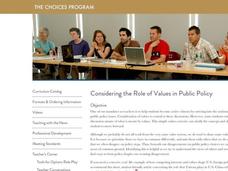Curated OER
Rural Communities Make a Difference
High schoolers research what analysts say influenced Ohio voters in a Presidential election and discuss what that meant in the election, especially in Ohio. Students use provide Internet sources for research.
Curated OER
Political Parties and What They Do
The emerging politicians in your government might be familiar with the words "Democrat" and "Republican," but what do they really know about the role of political parties in America? Use this activity to reinforce information from your...
Curated OER
Critical Thinking About Government
Young scholars research the Comox Band's system of government and report on what kind of government they think would work for them. In this government lesson plan, students decide between a hereditary system or an election system of...
Curated OER
Homemade Political Parties
Use this 5-day lesson to clarify the platforms of the two major parties, comparing and contrasting against students' beliefs. Begin by looking at unlabeled summaries of both party platforms, having learners identify most with one. Groups...
Curated OER
Closest Presidential Race Ever. . . Or Is It?
Students examine the presidential election of 2000. In this American history instructional activity, students listen to their instructor lecture on the details of the 2000 election. Students respond to discussion questions and...
Curated OER
The Presidential Nominating System
Students examine the process by which candidates for U.S. president are nominated by the Democratic and Republican parties. They identify the differences between primaries and caucuses and key terms and issues related to the primary...
Curated OER
The Election Is in the House: Was There a Corrupt Bargain?
Students take a stand, supported by evidence, on whether there was a "corrupt bargain" between Henry Clay and John Quincy Adams.
K20 LEARN
Electoral College: Does My Vote Count?
How can a candidate get the most votes, yet still lose the race for the presidency? This is has happened more than once in American history, including in the elections of 2000 and 2016. Using an activity for creating group notes, young...
Center for History Education
Did Southern Free Men of Color Fight for the Ideals of the South?
Much of history is distasteful. Primary sources often reveal attitudes acceptable at the time that no longer are. But to understand controversial historical events, historians must examine primary sources that represent a wide variety of...
Curated OER
Results In On Mock Election
Students examine the two presidential candidates in 2000, and identify their own stance on campaign issues. They create fictional candidates that represent their beliefs, and write campaign speeches from their point of view.
Curated OER
Primary Concerns
Students articulate their understanding of the primary process, critically evaluate the primary process on a systemic level and explore the significance of the Super Tuesday primaries on a Presidential election.
Curated OER
They Were Born Where?
Students assess where the presidents of the United States were born and analyze the role of geography in determining the outcome of presidential elections. They create graphs visualizing the birth and home states of the presidents along...
Curated OER
Rocking the Vote
Students explore how a presidential candidate can win the popular vote but not receive enough electoral votes to win the election. They analyze various regions' voting trends, explore how these trends reflect the outcome of the 2004...
Curated OER
Using Current Events to Understand Elections
Eleventh graders explore the the major phases of the electoral process for president. In this US Government lesson, 11th graders compare and contrast the delegate system of nomination and the electoral college.
Curated OER
Lincoln Home National Historic Site: A Place of Growth and Memory
Eighth graders study the history of Lincoln's home. In this American History lesson, 8th graders examine artifacts from his home to learn about his beliefs. Students participate in a webquest on Lincoln's home.
Curated OER
Government
Eighth graders analyze purposes of government, examine importance of citizenship to individuals and society at large, explain structure and functions of three branches of federal government, cite roles/duties, qualifications, and terms...
Curated OER
Electoral Systems
Students examine electoral systems and reach conclusions and judgements about the extent to which these requirements are met. The Canadian electoral system be examined as one other electoral system.
Curated OER
Electronic Elections
Students evaluate the role of voting in democratic societies and the potential of voting on the Internet.
Curated OER
Voting Systems
Students view many viewpoints on Britain's voting systems. Students compare/contrast various forms of electoral systems. Students trace the steps to proportional representation.
PBS
What Are the Primaries and Caucuses?
What are the essential differences between primaries and caucuses? As part of a study of the process by which Americans select their candidates for US president, class members examine the nominating process, the changes that have...
Classroom Law Project
What are some of today’s voting issues? Voting in Oregon, youth vote, and technology
The youth vote. Rock the Vote. Vote-By-Mail. Electronic voting. Class members investigate issues facing today's voters, and the ways they have adapted over the years to optimize voter turnout.
Brown University
Considering the Role of Values in Public Policy
Strong opinions come from deeply held values. Young citizens explore the values that are most important to them in a class discussion and activity. As they prioritize a list of values cards that include freedom, justice, and democracy,...
Curated OER
Electoral Politics
Students formulate their own opinions about the issues in an election campaign through a critical examination of political advertisements, candidate debates, and political cartoons.
Curated OER
Early Voting, Other Election Changes are Possible
Students use the internet and linked sites to explore current voting methods in their community. They research suggestions that have been made for changes and interview people who made these suggestions (when possible). Students suggest...

























